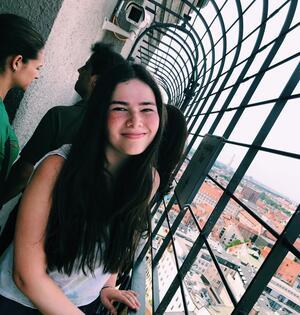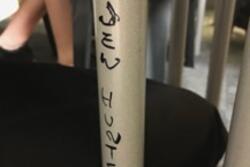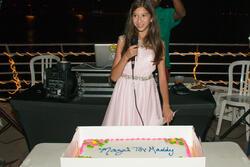Raising My Hand High
In September of 1938, my great-grandmother and great-grandfather received a letter from a Jewish family in Vienna who claimed to be distant relatives of my great-grandmother. Like many others, my great-grandparents petitioned HIAS, the Hebrew Immigrant Aid Society, to enable their family to sail to the United States. They agreed to “sponsor” them: to help them get jobs and to guarantee that they would never be dependent on government support. This was a large commitment in this time period because it was during the Depression and jobs were difficult to find. My great-grandmother was only 26 years old, and she already had a one-year-old baby and was expecting twins in a few months. My great-grandparents lived in rural New Jersey, and my great-grandmother had to take public transportation into New York City to stand in line at HIAS, alongside thousands of other people. My great-grandparents’ action most likely saved the family as well as generations to come.
This family history, which my grandmother told and retold as I grew up, was on my mind when, last summer, I decided to participate in a homestay program in Germany. I wanted to learn more German and be exposed to the culture, and what better way is there to learn a language than by staying in the country of origin? That is how I wound up spending three weeks in Germany and attending a gymnasium, the advanced German schooling system.
When I was accepted to the homestay program, I started to wonder about antisemitism in Germany. I’m not that religious; I attend a Reform temple that incorporates music during Shabbat services. However, I do avoid pork and shellfish. When I texted my German host sister before meeting her that I couldn’t eat pork, she immediately asked if I was Jewish. This led me to think about how being Jewish could influence my experience in Germany, in terms of friendships and sights that I would visit.
On one of my first days in Bad Reichenhall, one of the local gymnasium teachers asked us what we knew about German history. One person mentioned Otto von Bismarck and the conversation flowed from there. However, no one in the room mentioned the period starting in the 1930s, and this angered me. I hesitantly raised my hand and said “the Holocaust.” One of my peers in the classroom who sat next to me told me that I should not have mentioned it. I believe there are times in life when you have to talk about events that are uncomfortable, and my family’s connection to this time period made me raise my hand high in the air and speak.
A week later, when I told my American friends that I was going to visit the Dachau Concentration Camp Memorial Site, one of them sent me a Holocaust joke about gas chambers. I was furious that she would send the joke or even think it was funny. I did not reply.
During the trip, I had a difficult time discussing my values and praying. I learned that I was the first Jew that most people in my small southern German town had ever met. Almost everyone in the town was Christian. There were many churches, but I would have loved to see a synagogue. I had no opportunities to practice my religion, so each Friday night, I stayed up until 12:30am to livestream the Shabbat services at my temple. While I attended church with my host family, I felt spiritually lost and disoriented.
On the last day of class, we discussed the Holocaust and Adolf Hitler. The teacher began the discussion by asking what an Aryan person was. I immediately raised my hand and said that Aryans were the people that Adolf Hitler believed belonged in Germany, people who were not Jewish and who had stereotypical blonde hair and blue eyes. We looked at pictures of a Nazi children’s book that showed Jews as people with large noses. Then the German teacher told us to raise our hands if we were Jewish. I didn’t know what to do. I have never been asked my religion publicly. I didn’t want to raise my hand because I was afraid of what the teacher would say. But I did. When I put my hand up, she said that she did not want to be offensive while teaching, and she told me she had heard that there were people who hate Jewish people in America.
To this day, I do not understand what she meant by not wishing to be offensive while teaching. We must accept that history has occurred, and we need to learn from these mistakes in order to not repeat the past. Though I was nervous, I put my hand up when she asked if anyone was Jewish because I was thinking about my identity and how proud I am of my culture. I am lucky to have had a Bat Mitzvah, and I feel blessed to live in a city where I am able to pray at my temple. I thought about the values that I inherited from my family. While there are times in life when it feels uncomfortable to raise my hand, I always think about Martin Niemöller’s poem that I learned in tefillah during Hebrew school. If we don’t raise our hands and if we aren’t proud of what makes us up, who are we?
This piece was written as part of JWA’s Rising Voices Fellowship.







Wow!
What an experience! Your on-the-spot reactions to the challenges that you faced, were testimony to your inbred strength and rightful privilege. You were able to hold your hand up high against the negativity of your colleagues' boorish bias, because you knew you could hold your head up high with the positivity of your peerless heritage and its transcendent, eternal values.
What a brave young woman! The teacher’s comment, after making this student stand out as different, was strange and intimidating. Any minority student in our country, e.g., African. Muslim, etc., would have been mortified. The writer must have felt so alone in Germany. Had the Nazi regime not terrorized anddecimated the Jewish population Germany during her great-grandparents’ lifetime, there surely would have been many more of Ilana’s Jewish brethren in that classroom.
Wonderful, Ilana!
I am so proud of you, and honored to know you! Keep raising your hand high - you inspire me to raise mine!
I was so impacted by this essay-- beautifully written and full of mature insights and courageous actions. I learned a lot too!